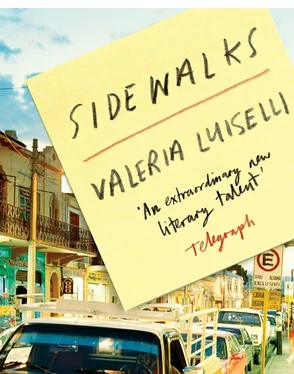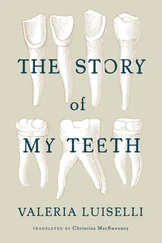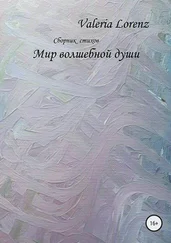But the soldiers eventually became immune to such palliatives. After many experiments, Hofer concluded that nothing produced better results than sending them back home.
Turn right at Tabasco
There is no such thing as a nostalgic or “saudadic” child, but there are melancholy ones. When I was about five years old someone told me you could dig a tunnel all the way to China. We were living in Central America and I thought I could save my family the expense of the plane fare by digging my way home. If someone had got as far as China, I could surely get to Mexico, which was much closer. I asked my father to tell me the exact direction of our house there and he drew me a map. I started digging a tunnel in a corner of the garden.
The tunnel project dragged on for several weeks, until I began to get bored.
I was on the point of abandoning the hole — by that time quite deep — when I suddenly hit something solid: a possible treasure chest. The three following mornings, I dug around that hard surface and completely forgot the original plan. Then I extended the treasure hunt. In the end, I made holes all over the garden, but never found anything more than a few earthworms and the water tank. Naturally, my parents began to lose patience. They ordered me to call a halt to the excavation. I obeyed, but it seemed to me that I should put the holes to good use by burying something in each of them. In one I hid some marbles, in another a toy train, and in a third a horrible paperweight with a snowscape. In the main hole, where the treasure that turned out to be a water tank had been, I placed the map my father had drawn for me. I thought that some future child — who, coincidentally, would also be Mexican and living in that same house — could reconstruct the story of the holes. Making use of more modern instruments than mine, that child would find the map and come to visit me in Mexico. And if too many years went by and I died, there would at least be a trace of my passage through that garden. From that moment, the garden stopped being an invitation to return to Mexico and became instead the promise of the future discoveries of that other child: I was cured of my precocious melancholic temperament — like a patient in the Middle Ages — by a bit of earth.
Ride on sidewalk for one block
Saudade, which retains some form of pain in the gliding movement between its first vowels, brings to mind those things that are at once beautiful and a little sad: boats, willows, saurian lizards, a bough.
Make a right at Chihuahua
The melancholy temperament was once the emblem of genius; black bile a divine substance. Aristotle was responsible for spreading this rumor, the echo of which was contested in the Middle Ages but apparently heard again by the Romantics and then by the poètes maudits and the aesthetes. But later, melancholy became mere aggravated emotionalism; and it is perhaps Sigmund Freud who bears the greatest responsibility for finishing off its founding myth. Freud democratized melancholy: once the psychiatrist’s couch had appeared on the scene, the illustrious and the intellectual were no longer the jealous owners of a divine illness. By the early twentieth century, melancholy had ceased to be the way of life and state of the soul of poets and had become a contemptible trait, only worthy of hysterical females on the couch. The same is true of nostalgia, which in time was no longer a hypochondria of the heart or a mental illness, but something from which maybe only Uruguayans and Norwegians suffer. Melancholy and nostalgia eventually ended up in the same bottomless pit: depression (according to the definition of the International Classification of Diseases).
Right again at Frontera
Sara insists that the most exact Spanish translation of saudade is “tiricia.” I’ve searched everywhere for definitions of that term. There are several on the internet:
Dentera (synonym): a disagreeable sensation in the teeth and gums on eating bitter substances and hearing certain unpleasant noises, corresponding to the English idea that something “sets one’s teeth on edge.”
Ictericia (synonym): a disease produced by the buildup of bilious pigment in the blood, the external sign of which is yellowness of the skin and the conjunctiva; in other words, jaundice.
In El Salvador: laziness, negligence, ill humor.
Infantile depression.
Two blocks on — make a right at Zacatecas
Now that melancholies and nostalgias are no longer owned by doctors, the “Ulysses Syndrome” has been discovered. In the strap line of a Spanish newspaper that Sara left on the couch some days ago, I read:
Fifty percent of immigrants develop some form of mental disturbance. .! A third of illegal immigrants are likely to suffer from the “Ulysses Syndrome.”
Despite the literary name given to the new pathology, it is also conceived of as a clinical problem. The symptoms of the disease: sadness, crying, stress, headaches, chest pains, insomnia, fatigue, and hallucinations. The remedies: psychiatrists and drugs. In Barcelona there’s already a team of doctors treating the affected “undocumenteds.” How many pills will be sold before it’s discovered that the Ulysses Syndrome can’t be cured by medicines? How many years before it is understood that the pain in the chest is nothing more than saudade, a bit of nostalgia, an excess of black bile?
Plaza Luis Cabrera — cross slowly
Commonplaces:
“Saudade is something you have.” You have saudade the way you have a plaything. It’s a perfect marble, round and never-ending. It’s a monad in the palm of your hand: a paperweight enclosing a miniature snowscape.
“Saudades are both pleasant and painful.” The scabs on knees we pick at until we draw blood; the teeth we prod with the tip of the tongue until they fall out; the pores on bare skin that open on contact with scalding bathwater.
“Saudade is the presence of an absence.” A stabbing pain in a phantom limb; a crack that opens up suddenly in the asphalt; the rivers and lakes of Mexico City; sheets after lovemaking.
“Saudade is saudade is saudade.” A map — of a map.
Turn south onto Orizaba
Wisdom from Cyril Connolly: “Imagination = nostalgia for the past, the absent; it’s the liquid solution in which art develops the snapshot of reality.”
But the nostalgia isn’t always nostalgia for a past. There are things that produce nostalgia in advance — spaces that we know to be lost as soon as we find them — places in which we know ourselves to be happier than we will ever be afterwards. In such situations, the soul twists itself around, as if in a voluntary simulacrum of seeing its present in retrospect. Like an eye watching itself look from the perspective of a later time, it sees that remote present and yearns for it.
Go left at Querétaro — use the sidewalk
Sara is doing an oil painting from a snapshot she took in Madrid some years ago, when we lived there together. It’s of a long, narrow street called the Paseo de los Melancólicos, through which we often had to ride home. Along the bank of the river Manzanares — that “liquid irony,” as Ortega y Gasset described it, due to its almost total lack of water — the melancholy Paseo de los Melancólicos stretches out like a pleonasm. On one side is a row of gray buildings, each one identical to the last. On the other, a concrete wall behind which one has to imagine that, a few steps away, an attempt at a river flows. In this section of its course, where the waters resemble black bile, the Manzanares has vents — tall tubes sprouting skyward from the water like the chimneys of an old, sunken factory. Nobody knows the purpose of those giant industrial pipes, but on some winter nights they emit a sound like whale song and a fetid vapor that settles on the Paseo de los Melancólicos like a beautiful, suffocating blanket.
Читать дальше












